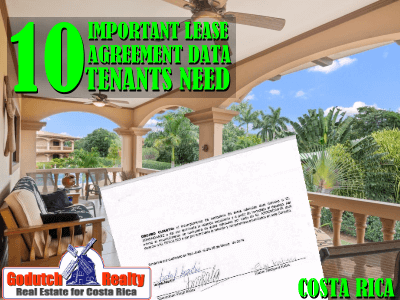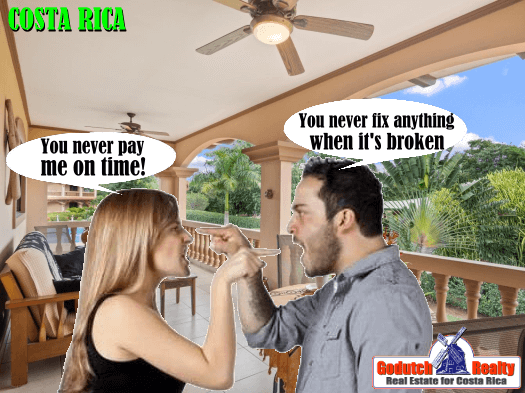 The rules for a lease agreement in Costa Rica are not as simple as you might think. I’ve seen 3-page and 10-page lease agreements.
The rules for a lease agreement in Costa Rica are not as simple as you might think. I’ve seen 3-page and 10-page lease agreements.
But if at one point during the lease there is a problem between the parties, there is no simple solution.
Costa Rica courts are not known for being speedy. A lawyer probably disagrees with me, but I always suggest to keep a lease agreement simple and as concise as possible.
The Costa Rican tenancy law is the Ley general de Arrendamientos Urbanos y Suburbanos, was approved in July 1995, and has 39 pages. And yes, it’s in Spanish. Click here for a copy of the tenancy law in Spanish.
Renting in Costa Rica is easy, you don’t have to be a legal citizen to do so. Nonetheless, there are lots of other details you should learn about, see in the 40 steps to take before renting a home in Costa Rica.
In this blog, I’m not getting into legal issues. Nine out of ten times, problems are generated because the tenant signed the rental agreement without have read it properly. Or, without understanding the Spanish language properly.

Although there 39 pages in the law, there are really only 10 Important Lease Agreement Data that you want to be covered in this legal contract:
1. Landlord and Tenant details
The lease agreement requires the property owner’s details – calidades – or the person who has the power of attorney. A power of attorney might be necessary if the property is in the name of a corporation, or if the owner is absent. Often, and especially with absent owners, you’ll find a person signing in the name of a landlord who has no legal right to do so.
The tenant needs to supply the following applicant details:
- Names as stated in the passport or legal identification
- Legal identification number – if a passport, it is important to state the nationality of the tenant.
- Age – although if the tenant is over 21 usually the word mayor is used
- Marital status – single, divorced, or married (how many times)
- Profession – engineer, doctor, or retired nurse for example
- Actual address – the tenant can fill out the new address, of the property to be rented.
The landlord also has to supply the same data. In case of corporate ownership – the name of the corporation, the corporate identification number – cedula juridica -, plus the same details as mentioned above for the person with the power of attorney to sign are needed.
2. Property Registration Information
The title number – numero de folio real – is necessary, so it’s clear which property you are renting. I wrote a blog on how to research the title of the property yourself. Then you can also check if the ownership of the property, mentioned in the lease agreement, is the correct one.
3. Whether it is a residential property or not.
It is important that the lease agreement mentioned if it’s a residential property or a commercial property. That’s because different leasing rules apply. If the property is a condominium, it’s also customary to make a statement about that in the agreement. The reason is that the tenant will have to follow the rules indicated in the bylaws of the condominium. In such a case, always request a copy of those bylaws.
It’s also important to make sure that the HOA fee is included in the monthly rent charged by the landlord, as well as property tax and garbage pickup.

4. Monthly rental fee
The monthly rent needs to be in the rental agreement. This amount should be fixed for three years. The monthly rent can be in colones or in U.S. dollars, usually at the Banco Central exchange rate of the payment date.
Some landlords will try to raise the rent amount every year, so check on this before signing the lease. The law allows for a rent increase if the agreement is in colones if the inflation of the last 12 months is higher than 15%. At the end of the legal 3 year-lease, the monthly rent can be re-negotiated.
5. Payment method and date
The lease agreement has to state when and where the rent has to be paid. The rent has to be paid within 7 natural days after the payment date. Although, if a good relationship between tenant and landlord is desired, payment on the payment date is important.
6. Lease Term
The lease term is 3 years by law. Many landlords prefer to do a lease agreement for 1 year, renewable for 2 more years. This gives a landlord the option to not renew a lease agreement after the first year, although this might not stand up in court.
The termination of the lease agreement can be 1, 2, or even 3 months.
7. Security deposit
The security deposit often is a problem. It is important to have a clear statement of what will happen with the security deposit if the tenant moves out before the lease term is over. Even more important is to have a description of the reasons the landlord can retain this security deposit.
8. Inventory
I have seen some rental agreements that describe a whole house or condo, including sinks, toilets, kitchen cabinetry, and lamps. I think it’s completely unnecessary, but if you prefer, take photos before you sign the rental agreement, of any damaged property.
If the unit you’re renting is furnished though, check the inventory well.
9. Repairs
It is quite common to see a statement in the agreement, such as “the tenants will pay for the reparation of any damage to the property not being caused by the normal use and course of time and by unforeseen forces of nature”. By law, the tenant is only responsible for all damage or deterioration caused by his fault, negligence, or by the action or omission of the people who live with him, his relatives, workers, clients, guests, and visitors. Therefore, check the unit for damage BEFORE you sign the lease.

10. Date of the agreement
The date of the agreement is especially important to know when the tenant or landlord wants to finalize the agreement. Or maybe negotiate a new rental price.
Unfortunately, many disagreements between landlord and tenant are created because there is a lack of communication. Often, landlords behave badly when repairs are needed or a security deposit has to be returned, because of the bad behavior of former tenants.
Taking a lease dispute to court in Costa Rica is expensive and any civil suit takes forever. Therefore, in my opinion, a good and happy relationship between the two parties is more important than a good lease agreement.
Are you interested in renting in Grecia or Atenas? Then contact us now.
If you like this blog, subscribe to my newsletter by clicking the banner below.
I DO want to remind our readers that we appreciate any referrals you can send us. Also, when talking about your home in Costa Rica, please remember the GoDutch Realty agents. We appreciate it.

























